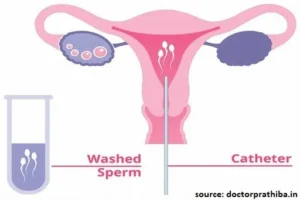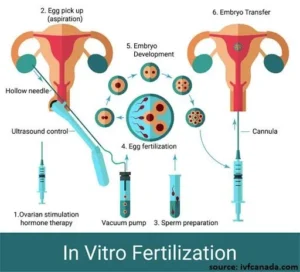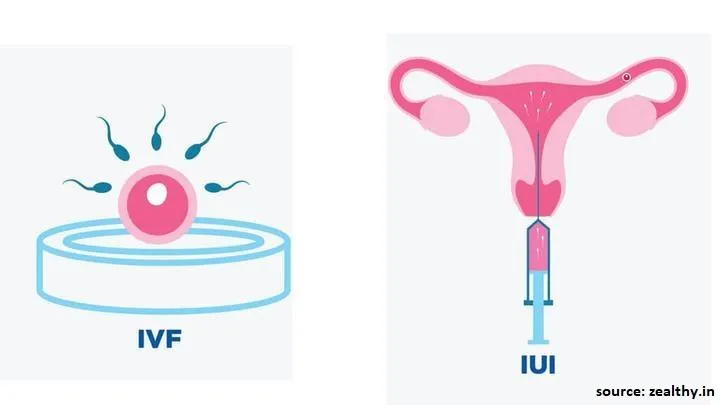Are you wondering whether you should go for IUI or IVF? There are many options to consider for fertility treatments in Ahmedabad. It is based on you and your partner’s specific requirements.
Nisha IVF fertility hospital in Ahmedabad offers both intrauterine insemination (IUI) and in vitro insemination (IVF).
Some people are more aware of one term over the other. They often do not know the difference between the two or what either treatment involves.
While it is essential to discuss your specific case with your fertility specialist, you should understand the difference between IUI and IVF.
Let us first start by understanding what an IUI procedure is?
What is IUI?
 Intrauterine insemination (IUI) is a simple in-office procedure. The doctor injects sperm that was previously collected and processed into your uterine cavity. Before injecting, the lab “washes” the sperm by removing seminal fluid and concentrating the sperm.
Your specialist will use the assistance of fertility treatments to increase ovulation function for the IUI treatment. IUI can also be performed during your natural ovulation.
The sperm is injected higher into the uterine cavity, bypassing the cervix. It makes the journey through the fallopian tubes shorter. It increases the number of sperms that encounter the egg.
Now that you understand what IUI is, let us move on to understanding IVF.
Intrauterine insemination (IUI) is a simple in-office procedure. The doctor injects sperm that was previously collected and processed into your uterine cavity. Before injecting, the lab “washes” the sperm by removing seminal fluid and concentrating the sperm.
Your specialist will use the assistance of fertility treatments to increase ovulation function for the IUI treatment. IUI can also be performed during your natural ovulation.
The sperm is injected higher into the uterine cavity, bypassing the cervix. It makes the journey through the fallopian tubes shorter. It increases the number of sperms that encounter the egg.
Now that you understand what IUI is, let us move on to understanding IVF.What is IVF?

In vitro fertilization, or IVF, is a fertility treatment procedure or an assisted reproductive technology (ART). In the procedure, eggs and sperms are combined in a lab.
Before the fertilization occurs, you require fertility medication to stimulate the ovaries. It will help in successful egg retrieval. Your IVF specialist will perform egg retrieval under anaesthesia. After that, insemination is performed on the same day.
Once fertilization occurs, your specialist will monitor the embryo to determine when to transfer it to the uterus.
What are the differences between IUI and IVF?
The main difference between IUI and IVF is that in IUI, fertilization takes place internally. It means the sperm is injected directly into your uterus. So, when fertilization is successful, the embryo implants itself into the uterus.
With IVF, fertilization occurs outside of the uterus, in a lab. The sperm and the egg are mixed for fertilization. After fertilization, one or more of these embryos are transferred into your uterus.
The embryo implants itself in the uterus lining, resulting in pregnancy and a full-term baby or baby’s delivery.
IVF has a higher success rate than IUI. However, it is generally recommended that couples try 3 rounds of IUI before moving on to IVF.
Now that you know the difference between IUI and IVF, let us move on to the commonalities between them.
What do IVF and IUI Have in Common?
IVF and IUI have some factors in common. They mostly have to do with getting ready for treatment and the necessary procedure of conceiving.
Before fertilization or insemination, both IVF and IUI might include intake of fertility drugs. It helps increase success rates in fertilization for IUI or assist in ovulation, and aid in egg retrieval for IVF.
Both treatments also include processes to separate the highest quality sperm from the samples you provide for fertilization.
For both IVF or IUI to be successful, an egg must be fertilized and then implanted in the uterus’ lining. It develops into a full-term infant or multiple infants.
What makes you an Ideal Candidate for IUI vs IVF?
IUI, or artificial insemination, is a more common fertility treatment. Other than that, it is often the first treatment most people try.
IUI requires viable eggs, working ovaries, and fallopian tubes. It also requires the availability of 5-10 million motile sperm after your specialist processes the ejaculate of the male partner.
If you or your partner do not meet the requirements for IUI, then you might consider IVF.
IVF is used for several infertility problems, including problems with unexplained infertility in women and men. IVF treatment also has a higher rate of successful pregnancies.
Now that you are clear about both the procedures, consult your fertility clinic in Ahmedabad. Your specialist can decide which treatment will best suit your condition.

